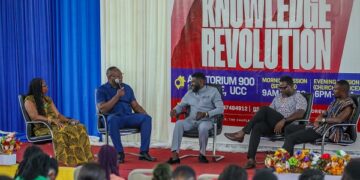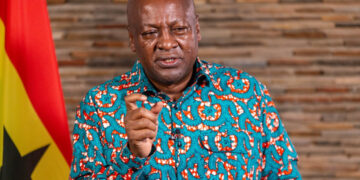Highlife music stands as a cornerstone of our rich Ghanaian cultural identity and heritage, weaving together rhythms, melodies, and narratives that resonate deeply with the country’s history and spirit.
Originating in the early 20th century, highlife emerged from the fusion of traditional Ghanaian rhythms with Western instruments and musical styles brought by sailors and settlers.
This genre quickly became a musical symbol of joy, resilience, and community spirit, reflecting the social fabric of Ghanaian society.
At its core, highlife embodies the vibrancy and diversity of the rich Ghanaian cultural heritage.
Its infectious rhythms, often driven by percussion instruments like the talking drum and guitar bands, create a pulsating beat that invites both reflection and celebration.

Charles Kojo Fosu, Highlife musician
Highlife lyrics often touch on everyday life, love, social issues, and the aspirations of the Ghanaian people, making it a deeply relatable and accessible form of expression for all.
Moreover, highlife music has played a pivotal role in shaping Ghana’s national identity and fostering a sense of unity among its people.
Read This Also: Van Vicker reveals why he didn’t feature in Lil Win’s ‘A Country Called Ghana’ movie

Highlife Legend, Abrante Amakye Dede, (Creator: Snr. Dzoku Copyright: @1Shotphotography)
Through its evolution over decades, highlife has adapted to incorporate elements of jazz, funk, and Afrobeat, yet it has never lost its distinct Ghanaian essence.
Artists like E.T. Mensah, Osibisa, and Amakye Dede have contributed significantly to its evolution, each leaving an indelible mark on the genre and inspiring generations of musicians.
In contemporary times, highlife continues to thrive, blending tradition with modern influences.

Ewurama Badu, legendary Ghanaian Highlife musician
Its enduring popularity is evident in festivals, concerts, and everyday gatherings across Ghana and beyond.
This musical genre not only entertains but also educates, serving as a repository of cultural history and a medium for storytelling.
Through its melodies and rhythms, highlife bridges generational divides, fostering a shared sense of pride and belonging among Ghanaians worldwide.
In conclusion, highlife music remains an invaluable cultural asset and a source of national pride for Ghana.
Its ability to evolve while maintaining its roots is a testament to its resilience and enduring relevance.
As Ghana navigates the complexities of modernity and globalization, highlife stands as a beacon of cultural continuity and a testament to the richness of Ghanaian musical heritage.
Embracing and celebrating highlife is not merely a nod to the past but a step towards preserving and promoting Ghana’s unique musical identity for generations to come.



























